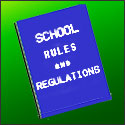Discipline at a girls' grammar school in 1950s Britain

Rules, regulations and discipline did exist at girls' grammar schools in 1950s Britain, but obeying the rules and regulations became second nature for most pupils and the discipline was applied with a light touch. This page elaborates, There is a separate page on school discipline in previous years, and it includes how it was worse for boys than girls even as late as the mid-20th Century.
____
By the webmaster, based on personal recollections from Copthall School and contributions from former students from later years of the mid-20th Century
Rules and regulations
Below is a list of the significant rules as I remember them. However because it was second nature for most pupils to obey them and because, as far as I know, they were never written down, I may be omitting some:
- School uniform, particularly berets, to be worn on journeys to and from school. I can't remember if berets had to be worn in the summer. Can you?
- Transfer from one class to another between lesson to take place within a three minute time slot, the onset indicated by one bell and the conclusion by three bells. No talking after the three bells.
- All text books to be covered with clean brown paper supplied by parents.
- All girls except those in the sixth form to stand when a teacher enters the room.
- At the end of the day, chairs to be placed on desks to allow the cleaners to get to floors easily.
- Not to use the front entrance and stairs which were reserved for staff.
- No running in corridors. (Sub-prefects were on duty at peak times to enforce this rule.)
There was also pressure rather than rules. All girls, actually their parents, were expected to contribute to various charities.
There may have been rules about gross misdemeanours, like perpetual bad behaviour, truant or failure to do homework, but they were unknown to almost all of us. We were just told to do certain things and we did them.
In practice it was second nature to obey these rules. Most of us enjoyed school; we had all passed the scholarship that became the 11-plus exam to the top school in the area and were being taught by able teachers who cared about their subjects and us. It didn't occur to us to be naughty. I realise that I was fortunate. If it was different for you, please contact me.
Rewards
Good behaviour was rewarded with what was called a 'deportment' badge. It was said to be for more than standing and sitting upright, but we received absolutely no information at all on what else it was for or how to go about developing it. That always struck me as a shame, because I always hoped I would get a deportment badge - but I never did.
On reflection in later life, I feel that deportment badges went to girls who behaved as if they were trained by public schools, that is who came from what my mother would have called 'better class families' - but try as I did, I couldn't work this out at the time.
There were no prizes for progress or achievement as far as I remember. Progress and achievement were taken for granted this school.
Punishments
Punishments were rare as there was little need for them.
The significant punishment was a detention. It was not given lightly. I got one once for touching - lightly touching, not hitting or scraping - a teacher's car which had recently been re-sprayed, and I was terribly upset and ashamed about it. It went on my report and I told my parents that it had been a class detention. It involved sitting in a classroom for half an hour after school with a teacher invigilating. I don't think any particular work was set. No-one from the school contacted parents to explain that a girl would be late home. 'Health and Safety' was not an issue then.
Anyone who had three detentions in one term was called up onto the stage during assembly, to be named and shamed. That never happened to me, and I don't think it happened to anyone in my class throughout my time at the school. Those who were called up always seemed to me to be in the lowest stream and to be more interested in make-up and boys than the girls in the other streams. Not that we were not interested in make-up and boys, but, for us, they had their place which was out of school.
Prefects could give lines, but I know very little about this as I was never given any.
What it was like to be given lines at school
contributed by Sally Lawson (formerly Sally Porte)
I was given a hundred lines once or twice. Writing something a hundred times was very time consuming and something one chose not to repeat too often!
If you were at Copthall around this time, you will probably like the pages on life in the 1940s and 50s - see the menu on the home page. Information and photos are always welcome.
| sources | webmaster | contact |
Text and images are copyright
If you can add anything to this page or provide a photo, please contact me.



